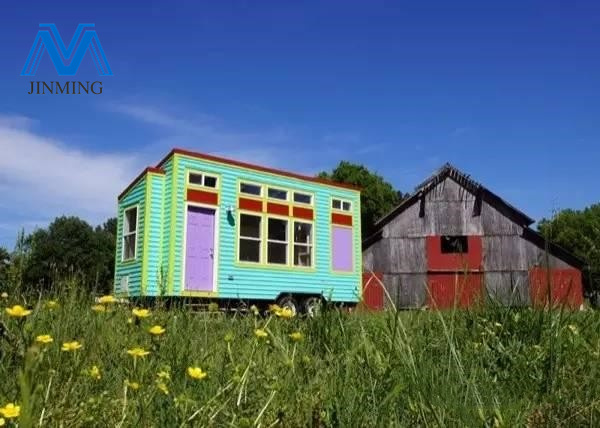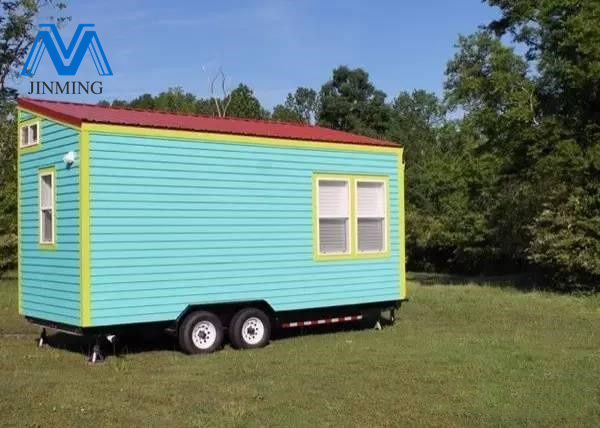
Privacy statement: Your privacy is very important to Us. Our company promises not to disclose your personal information to any external company with out your explicit permission.

Container houses on wheels represent a revolutionary shift in the concept of mobile living, combining the practicality of container architecture with the flexibility of a Mobile Home. This innovative approach offers a unique blend of convenience, sustainability, and adaptability, making it an appealing option for those seeking a dynamic and versatile lifestyle.
Design and Functionality
Container houses on wheels are built using shipping containers that have been repurposed into functional living spaces. These containers are mounted on a wheeled chassis, allowing them to be easily transported from one location to another. This design provides a mobile living solution without sacrificing the comfort and functionality of a traditional home.
The modular nature of container houses allows for a wide range of designs and configurations. From compact studios to spacious family homes, the flexibility in design enables customization to meet diverse needs and preferences. Interior layouts can be adapted to include essential living spaces such as kitchens, bathrooms, and living areas, all within the confines of the container's structure.

Benefits of Container Houses on Wheels
Mobility and Flexibility: One of the most significant advantages of container houses on wheels is their mobility. They offer the freedom to relocate without the hassle of traditional moving processes. Whether for travel, work, or lifestyle changes, residents can easily transport their home to new locations, experiencing different environments and landscapes.
Cost-Effectiveness: Container houses on wheels are often more affordable than traditional homes or RVs. The use of repurposed shipping containers helps reduce material costs, while the efficiency of design and construction contributes to lower overall expenses. Additionally, the ability to move the home reduces the need for permanent land purchases or long-term leases.
Sustainability: The use of shipping containers as building materials promotes sustainability by repurposing existing structures and reducing waste. Container houses on wheels are an eco-friendly option, as they often incorporate energy-efficient systems, such as solar panels and rainwater collection, further minimizing their environmental footprint.
Durability and Strength: Shipping containers are designed to withstand harsh conditions during transport and storage, which translates to a durable and robust living structure. This durability ensures that container houses on wheels can endure various environmental conditions and provide long-lasting performance.
Quick Setup and Construction: The modular design of container houses allows for rapid construction and setup. Prefabricated components are assembled quickly, and the wheeled chassis simplifies the relocation process. This efficiency is particularly beneficial for those seeking a fast and flexible housing solution.
Customization: Container houses on wheels offer ample opportunities for customization. Interior designs, exterior finishes, and additional features can be tailored to match individual preferences and needs. Whether integrating modern amenities or personalizing aesthetic elements, the flexibility in design ensures a unique living experience.
Challenges and Considerations
Container houses on wheels offer numerous advantages, including mobility and cost-efficiency, but they also come with their own set of challenges and considerations. Addressing these factors is essential for ensuring that the Container House remains a practical and enjoyable living solution. Here are some key challenges and considerations to keep in mind:
Space Constraints: Container houses are often limited in size due to the dimensions of standard shipping containers. This can restrict the layout and interior design options, making it necessary to carefully plan and optimize space usage.
Structural Modifications: While containers are robust, modifying them for windows, doors, and interior layouts can be complex. Ensuring structural integrity after alterations requires careful planning and professional assistance.
Thermal Insulation: Tiny House On Wheels are made of metal, which can lead to extreme temperature fluctuations inside. Proper insulation is essential to maintain a comfortable indoor climate. This often involves additional materials and can affect the overall design and space.
Ventilation: Proper ventilation is crucial to prevent condensation and mold growth. Container houses need effective ventilation systems to ensure air quality and comfort, especially in varying climates.
Building Codes: Mobile Home must comply with local building codes and regulations, which can vary significantly by region. Ensuring compliance may involve additional inspections, permits, and modifications.
Zoning Restrictions: Some areas have zoning regulations that may restrict or regulate the use of container houses, especially on wheels. It’s important to check local zoning laws and obtain necessary approvals before placing or relocating the container house.
Vehicle Compatibility: Container Home On Wheels require a compatible towing vehicle. Ensuring that the vehicle can safely transport the container and handle road conditions is crucial for successful relocation.
Road Regulations: Different regions have varying road regulations regarding the size and weight of mobile structures. Understanding and adhering to these regulations is necessary to avoid legal issues and ensure safe transport.

Conclusion
In conclusion, while container houses on wheels offer significant benefits such as mobility, cost-efficiency, and innovative design, they also come with a set of challenges and considerations that must be carefully managed. From addressing design limitations and ensuring effective insulation to navigating regulatory requirements and maintaining structural integrity, successful implementation of container houses on wheels requires thoughtful planning and attention to detail.
By understanding and addressing these challenges—such as space constraints, climate control, transportation logistics, and utility connections—owners can maximize the advantages of this versatile living solution. With proper maintenance and adherence to local regulations, container houses on wheels can provide a dynamic, flexible, and sustainable housing option that aligns with modern lifestyle needs. Embracing these considerations ensures that the unique benefits of container houses on wheels are fully realized, offering a comfortable and adaptable living environment for years to come.

Privacy statement: Your privacy is very important to Us. Our company promises not to disclose your personal information to any external company with out your explicit permission.

Fill in more information so that we can get in touch with you faster
Privacy statement: Your privacy is very important to Us. Our company promises not to disclose your personal information to any external company with out your explicit permission.